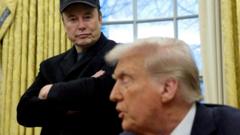The U.S. Department of Government Efficiency has announced a $51 million cut to the African Development Foundation, focusing on what it labels as unnecessary expenditures on niche industries abroad, reallocating resources to address economic challenges in the U.S.
$51 Million Cut from U.S. African Development Foundation Targets Perceived Waste

$51 Million Cut from U.S. African Development Foundation Targets Perceived Waste
The Department of Government Efficiency eliminates funding for various international projects, citing economic priorities at home.
The Department of Government Efficiency (DOGE) has announced a significant move to cut $51 million from the U.S. African Development Foundation (USADF), identifying wasteful spending on specialized marketing and agricultural initiatives overseas as the main target. The decision has sparked discussions about resource allocation and economic priorities in the current climate.
In an update shared on X, DOGE enumerated several expenditures that raised eyebrows, detailing the following allocations that led to the budget cuts:
- $229,296 dedicated to promoting organic shea butter in Burkina Faso
- $246,217 spent on facilities for mango drying in the Ivory Coast
- $239,738 for promoting pineapple juice in Benin
- $99,566 aimed at boosting yogurt production in Uganda
- $84,059 for establishing a spa and wellness business incubator in Nigeria
- $50,000 to train farmers in Senegal on dragon fruit cultivation
- $48,406 for a WhatsApp marketing chatbot in Kenya
While USADF defended its initiatives, arguing that these programs supported local economic growth, DOGE maintained its stance that taxpayer funds should not back boutique industries abroad, particularly as many Americans face inflation and economic uncertainties.
This budget reduction is framed within DOGE's broader strategy, which has been championed by Elon Musk since the Trump administration, to slash $1 trillion from what is deemed wasteful federal expenditure and better align government resources with essential national needs. As the ongoing debate continues, the impact of these cuts on international development and U.S. foreign relations remains to be seen.


















